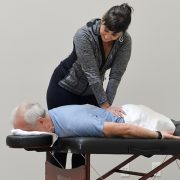6 Reasons Your Back Surgery Failed
Back surgery, often viewed as a last resort for those suffering from debilitating back pain, has become increasingly common in the last 15 years.
A quick Google search reveals that an estimated 1.5 million spinal fusions are performed annually in the United States alone. When you consider that 70-80% of all back pain is considered “non-specific” and does not require surgery – that number is staggering. Additionally, it’s been well documented that 20-40% of all back surgeries fail, resulting in what we call “Failed Back Surgery Syndrome”. So why then – do we continue to operate?
If you or a loved one is considering back surgery – I highly recommend you do your due diligence and research first.
To give you a head start – here are 6 reasons why back surgery often fails:
1. Incorrect Diagnosis
If the wrong diagnosis leads you to an unnecessary surgery – then your back surgery is going to fail. How does this happen? All too often we blame aging structures in the spine as the main source of our pain. But what many fail to understand is that arthritis and degenerating discs (for example) are a normal part of aging. Everyone has it – but not everyone has back pain. An aging spine is not a reason to get back surgery – so be cautious anytime someone blames arthritis or disc degeneration for your pain. It’s typically not the full story.
2. Surgical Complications
Surgical complications are a risk when you undergo any type of surgery – even when it’s coined “minimally invasive”. From anesthesia reactions, to accidentally nicking a nerve, to the possibility of infection – complications can occur – and some of them irreversible. Conservative therapy and natural treatments involving movement and exercise come with virtually no risk – and have better outcomes than surgery according to research. You want to make absolutely certain that a back surgery is warranted before you put yourself at risk for complications.
3. Scar Tissue
Scar tissue is an unavoidable consequence of any surgery and a necessary part of the healing process – but its impact is significantly underestimated. For some, scarring can get out of control and be excessive, manifesting itself similar to an auto-immune condition. For others, they simply have no clue that scars need to be managed and mobilized. Unmanaged scar tissue will become adhesive and may cause problems with your nerves, fascia, and general mobility. While there are treatments such as Shockwave therapy that can help regenerate damaged soft tissue from scarring – unmanaged scar tissue can be one reason your pain doesn’t resolve after back surgery.
4. False Expectations
A lot of folks go into back surgery with false expectations. They think they’ll be out of pain and back to their activities in no time. But proper healing from back surgery is deceivingly long. While most incisions will technically heal in about 2 weeks – your body has a different timeline. Most people grossly underestimate the impact their condition prior to surgery will have on their recovery. Your pain may be gone after surgery, but all of the underlying, compensatory problems that developed leading up to your surgery have not magically disappeared.
For example, it takes a minimum of 6-8 weeks to build and retrain muscle. If you had nerve impingement that was inhibiting a muscle from performing properly, it’s going to take several months to get that strength back. When this is not considered, and you jump back into activities too soon, you’re asking for trouble.
False or mismanaged expectations about recovery after back surgery is a big reason for poor outcomes.
5. Images are Misleading
X-rays and MRI’s do not tell the full story when it comes to back pain. And in most cases, they are misleading and can result in an incorrect diagnosis. For example, I already mentioned to you that most things you see in your images – such as arthritis, degenerative disc disease, and even bulging discs – occur naturally as you age.
But they don’t always lead to back pain.
Studies have shown that 60% of folks in their 50’s will have bulging discs on X-ray and 80% will have disc degeneration – regardless of whether back pain is present or not. These statistics only increase with age. If you allow your imaging alone to dictate your decision to get back surgery – you’re increasing your risk of it failing because it may not have been necessary in the first place.
6. Back Surgery Makes Money
At the end of the day, healthcare is a business. And back surgeries are among the most lucrative procedures in the medical industry. According to studies and statistical data, common back surgeries like lumbar fusion cost anywhere from $50,000 to $90,000. But it only costs hospitals a fraction of that amount to actually administer. Plus, despite its unethical nature, some surgeons have been reported to receive kickbacks for using certain medical devices and performing more surgeries. While this is an indirect reason for your back surgery failing, it’s not something you can ignore. The profitability of back surgery naturally lends itself to being overutilized when there could be better, natural solutions instead.
After all this, I hope you can see that back surgery isn’t a decision you should take lightly, and a good outcome should not be assumed.
Consider the statistics. Anywhere from 20-40% of all back surgeries fail and it could be due to any of the reasons we just looked at. Most back pain (70-80% to be exact) is considered non-specific and mechanical in nature, and can be resolved naturally with prescriptive exercises, lifestyle changes, and corrective movement strategies. It’s worth exhausting all of these options first before jumping into a surgical procedure that has a good chance of failing you.
Dr. Carrie Jose, Physical Therapy Specialist, and Mechanical Pain Expert, owns CJ Physical Therapy & Pilates in Portsmouth, NH, and writes for Seacoast Media Group. If local to Portsmouth, NH, and looking for help – request a FREE Discovery Visit with one of her Specialists by CLICKING HERE.










